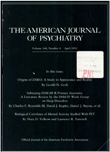Seasonal and mood independence of low basal prolactin secretion in premenopausal women with seasonal affective disorder
Abstract
To test hypotheses of opposing roles of dopamine and serotonin in prolactin secretion in seasonal affective disorder, the authors determined basal serum prolactin concentrations for premenopausal women, eight with and 14 without seasonal affective disorder, in late afternoon during the follicular phase of the menstrual cycle (and a subgroup during the luteal phase) in winter and summer. Despite their significantly higher Hamilton depression scale scores in winter than in summer, the patients had significantly lower prolactin concentrations than the control subjects in both seasons. These results suggest that low prolactin secretion may be a trait characteristic in seasonal affective disorder.
Access content
To read the fulltext, please use one of the options below to sign in or purchase access.- Personal login
- Institutional Login
- Sign in via OpenAthens
- Register for access
-
Please login/register if you wish to pair your device and check access availability.
Not a subscriber?
PsychiatryOnline subscription options offer access to the DSM-5 library, books, journals, CME, and patient resources. This all-in-one virtual library provides psychiatrists and mental health professionals with key resources for diagnosis, treatment, research, and professional development.
Need more help? PsychiatryOnline Customer Service may be reached by emailing [email protected] or by calling 800-368-5777 (in the U.S.) or 703-907-7322 (outside the U.S.).



